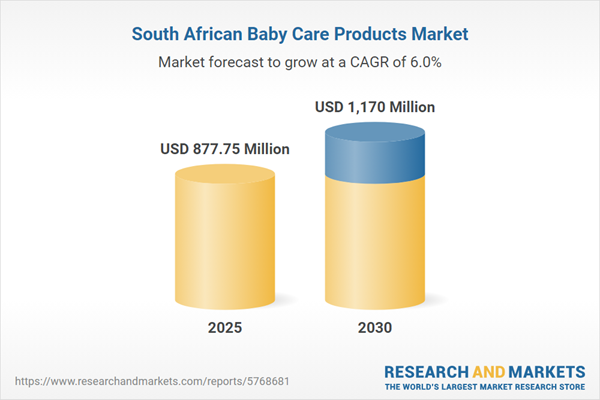Baby care products are items designed for newborns and children under the age of three and are designed to be gentle and non-irritating and contain components that have been chosen for these qualities. Factors such as baby health issues, such as skin illnesses, and the demand for nutritional diets, are driving the South African baby care product market growth. Many variables influence the market, including the rising birthrate, affordability, and changing lifestyles in the region.
The increasing disposable income of the South African population in addition to the presence of key market players in the country for the same are some of the prominent drivers of thebaby care products marketin the country. Also, the growing infant population coupled with the declining infant mortality rate in South Africa is anticipated to boost the overall market growth. Furthermore, the growth in the number of working women in South Africa is also expected to drive the potential of baby care products in the country over the next few years.
Due to extensive urbanization, the proportion of nuclear families in which parents work is resulting in an increase in the per capita baby-care spending. According to a parliamentary monitoring group, 63% of South Africans already live in cities, with the figure expected to climb to 71 percent by 2030. By 2050, eight out of ten people will be living in cities, which will boost the demand for baby care products.
South African baby care products market drivers
Growing awareness and increasing urbanization
An increasing number of parents are opting for plant-based and organic baby care products, such as body washes, diaper creams, andbaby wipes, due to growing worries about their infants' fragile and sensitive skin. Furthermore, these goods provide several advantages that aid in treating skin allergies, discomfort, rashes, and other skin-related ailments. Such occurrences are projected to increase market expansion significantly throughout the forecast period. With growing urbanization, there has been an increasing development of stores with baby care products in the region which is also expected to propel the market growth.Reasons for buying this report:
- Insightful Analysis: Gain detailed market insights covering major as well as emerging geographical regions, focusing on customer segments, government policies and socio-economic factors, consumer preferences, industry verticals, other sub-segments.
- Competitive Landscape: Understand the strategic maneuvers employed by key players globally to understand possible market penetration with the correct strategy.
- Market Drivers & Future Trends: Explore the dynamic factors and pivotal market trends and how they will shape up future market developments.
- Actionable Recommendations: Utilize the insights to exercise strategic decision to uncover new business streams and revenues in a dynamic environment.
- Caters to a Wide Audience: Beneficial and cost-effective for startups, research institutions, consultants, SMEs, and large enterprises.
What do businesses use our reports for?
Industry and Market Insights, Opportunity Assessment, Product Demand Forecasting, Market Entry Strategy, Geographical Expansion, Capital Investment Decisions, Regulatory Framework & Implications, New Product Development, Competitive IntelligenceReport Coverage:
- Historical data & forecasts from 2022 to 2030
- Growth Opportunities, Challenges, Supply Chain Outlook, Regulatory Framework, Customer Behaviour, and Trend Analysis
- Competitive Positioning, Strategies, and Market Share Analysis
- Revenue Growth and Forecast Assessment of segments and regions including countries
- Company Profiling (Strategies, Products, Financial Information, and Key Developments among others)
The South African baby care products market is analyzed into the following segments:
By Product Type
- Baby Food
- Dried Baby Food
- Milk Formula
- Prepared Baby Food
- Others
- Body Care
- Baby Skin and Haircare
- Diapers and Wipes
- Safety and Convenience
- Prams and Strollers
- Car seats
- By Distribution Channel
- Online
- Offline
- By State
- Johannesburg
- Cape Town
- Durban
- Others
Table of Contents
Companies Mentioned
- Johnson & Johnson
- Pigeon Corporation
- Unicharm Corporation
- Orchard Baby Foods
- Nestle
- Avon Products Inc.
- L'oreal SA
- Procter & Gamble Co.
- Danone SA
- Unilever PLC
Table Information
| Report Attribute | Details |
|---|---|
| No. of Pages | 86 |
| Published | December 2024 |
| Forecast Period | 2025 - 2030 |
| Estimated Market Value ( USD | $ 877.75 Million |
| Forecasted Market Value ( USD | $ 1170 Million |
| Compound Annual Growth Rate | 6.0% |
| Regions Covered | South Africa |
| No. of Companies Mentioned | 10 |









